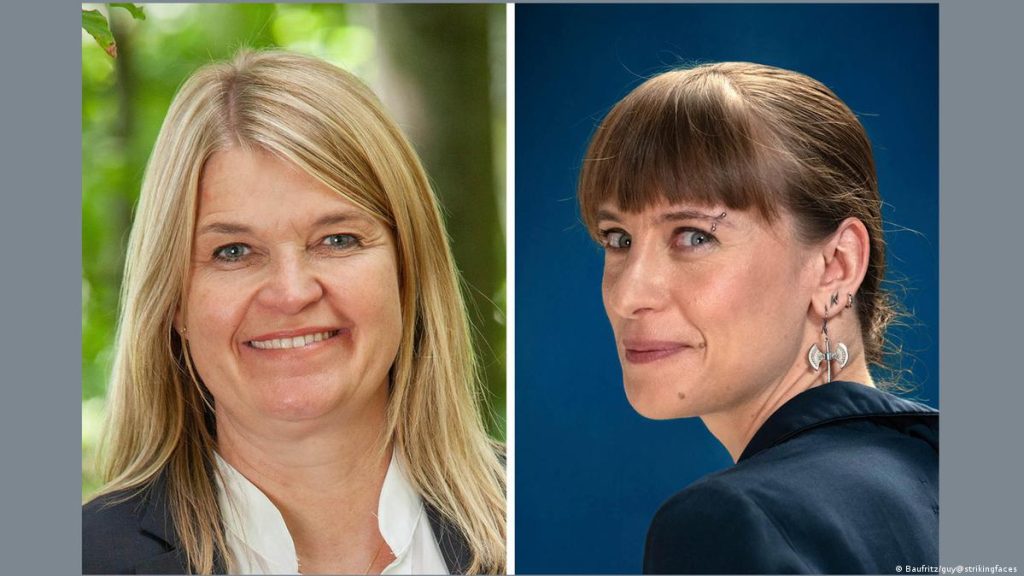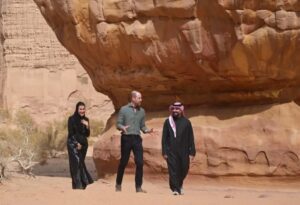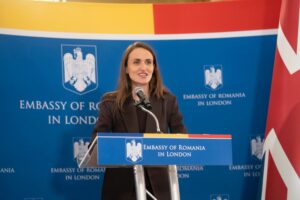Climate scientist and sustainable builder win top eco award

London, The Gulf Observer: Understanding how global heating, caused in large part by burning carbon-intensive fossil fuels, is worsening extreme weather such as floods, storms and droughts, and finding ways to create a carbon-neutral world define the work of this year’s German Environmental Award winners.
Friederike Otto, climatologist at Imperial College London and co-founder of World Weather Attribution, which draws a connection between climate change and extreme weather events, and Dagmar Fritz-Kramer, the managing director of Baufritz, a climate-neutral building company utilising low-carbon timber, shared the award presented on October 29.
“With the outstanding energy they have shown in their respective fields, both award winners have demonstrated that we cannot afford to lose any more time in the fight against the climate crisis,” said Alexander Bonde, the secretary general of the German Federal Environmental Foundation (DBU – Deutsche Bundesstiftung Umwelt) behind the award.
“They are a true inspiration and motivation for us to learn from the impacts of global warming, which are already evident today, and to continue implementing more and more environmental and resource protection measures so that our planet remains a habitable place.”
When Friederike Otto was working on climate models as a postdoctoral student in Oxford in the early 2010s, she noticed that many in the scientific community were wary of attributing single extreme weather events to climate change.
There was a belief that it was too difficult to say whether global heating made a single storm or heat wave more likely, or more severe, she told DW.
“It was almost a dangerous thing for the scientific community not to say anything,” she said of a failure to attribute the increasing frequency and impacts of extreme heat, flooding or storms to the changing climate.
But based on her own climate models — and her motivation to compare historical weather data when there was less warming compared to today — Otto “felt that we can do this.” She then founded WWA with her colleague Geert Jan van Oldenborgh in 2015.
“I still think that in order for us to do something really about climate change, we need to connect our experiences with the theory,” she said. “And that’s what we do at World Weather Attribution, only that we do it quickly. When extreme events are happening, that’s when people care about it, that’s when people have questions.”
World Weather Attribution has since developed into a global network of experts that provide rapid analysis of the influence of human-caused climate change on world weather events: from the wildfires consuming southern Europe this summer to the extreme German floods of 2021, and to unprecedented heat waves in North America.
In recognition of the importance of this work, in 2021 both Otto and Oldenborgh were included in Time magazine’s list of the top 100 most influential people.
“The reason why we are so successful is because there is a big demand in understanding the role of climate change in everyday experiences. We are more or less the only group doing this,” she said.
Using scientific evidence to explain the link between worsening storms and heat waves and greenhouse gas emissions is also helping to hold those who create these emissions — including fossil fuel companies — accountable in the courts, Otto explained.
Beyond attribution analysis that is turned around quickly to accompany reporting of weather disasters, the climate scientist is embarking on deeper research to support claims for so-called loss and damage, or compensation, from climate vulnerable communities.
Otto told DW that despite the ever-increasing body of evidence linking extreme weather to global heating, she’s also concerned about the increasing demonization of climate protesters and activists like Last Generation.
“The way they are talked about by politicians is really disconcerting,” she said, adding that activist demands for rapid emission cuts are simply what “countries have signed up to anyway in the Paris agreement.”
German Environmental Award co-winner Dagmar Fritz-Kramer is continuing a four-generation tradition of Baufritz builders using local timber from the Allgäu region of southern Germany and applying this heritage to constructing carbon-neutral housing.
Certified timber grown in sustainably managed European forests accounts for around 85% of the material used in a Baufritz house. The wood captures, on average, 50 metric tons of CO2 from the atmosphere per house after deducting the environmental impact from construction and transport. This saving is equivalent to the carbon emissions of an average mid-range car over 20 years.
“There was way too much resource consumption in the past,” Fritz-Kramer told DW of a construction industry which, she said, produces 50% of all waste in Germany. Much of these materials are high-carbon concrete and steel, explaining why around 40% of Germany’s annual planet-heating greenhouse gases are emitted by the sector.
German Environmental Award co-winner Dagmar Fritz-Kramer is continuing a four-generation tradition of Baufritz builders using local timber from the Allgäu region of southern Germany and applying this heritage to constructing carbon-neutral housing.
Certified timber grown in sustainably managed European forests accounts for around 85% of the material used in a Baufritz house. The wood captures, on average, 50 metric tons of CO2 from the atmosphere per house after deducting the environmental impact from construction and transport. This saving is equivalent to the carbon emissions of an average mid-range car over 20 years.
“There was way too much resource consumption in the past,” Fritz-Kramer told DW of a construction industry which, she said, produces 50% of all waste in Germany. Much of these materials are high-carbon concrete and steel, explaining why around 40% of Germany’s annual planet-heating greenhouse gases are emitted by the sector.
Dagmar Fritz-Kramer and Friederike Otto are, in fact, working together to generate climate finance for sustainable, low-carbon buildings.
Working with some of Otto’s students at Imperial College London, Fritz-Kramer said the project aims to show how responding to the climate crisis with carbon-neutral construction can also become an opportunity to grow the economy.


